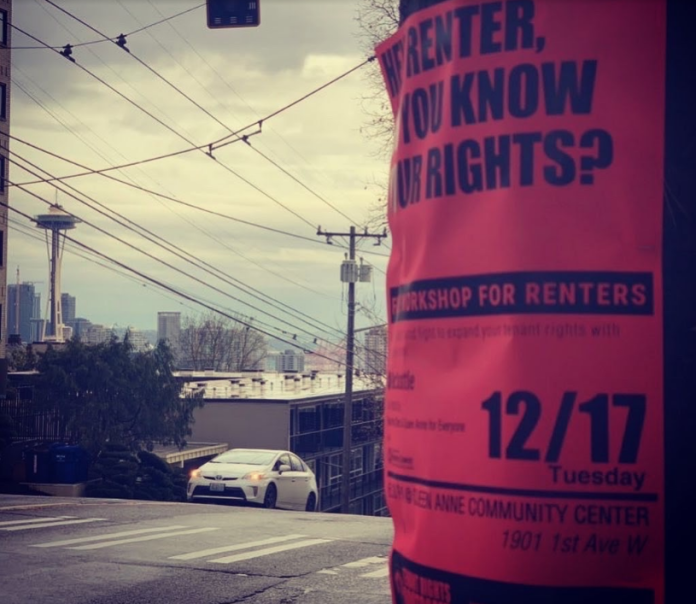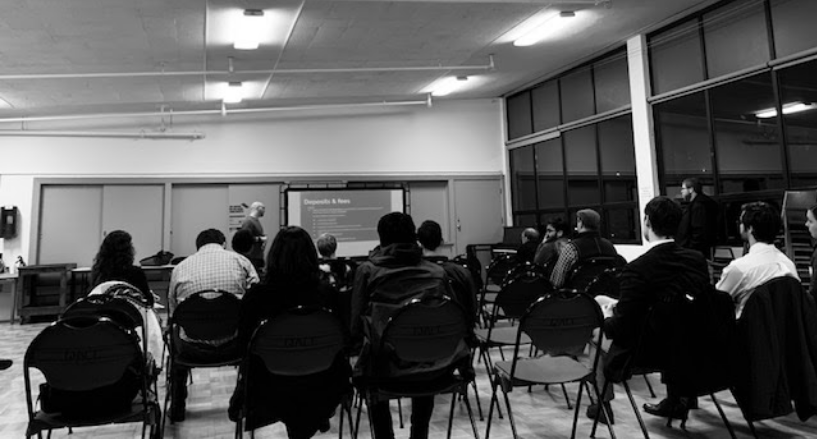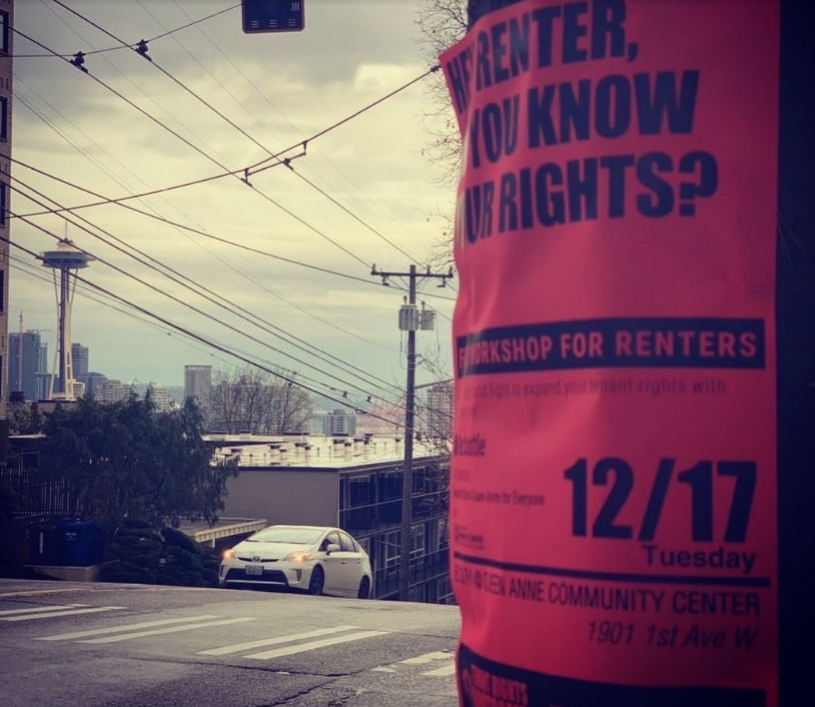
Seattle and Washington State want to maintain housing affordability and the other Washington (D.C.) laid the groundwork to do it via legislation providing tenants the right to buy their home.
I recently attended a 2020 legislative preview hosted by Seattle/King County Coalition on Homelessness. Rep. Nicole Macri (D-Seattle) and Sen. Patty Kuderer (D-Bellevue) emphasized the need to preserve existing housing stock as a homelessness prevention strategy. Currently, Washington State and Seattle have several paths to preserving affordable housing. Strengthening tenant rights was also mentioned as a critical policy goal for this legislative session.
Throughout the ten years I’ve lived in Seattle, as the percentage of renters has grown in Seattle, so has our power. There is a lot to celebrate. In 2012 Seattle passed a Rental Registration and Inspection Ordinance (RRIO). Recently, Washington Community Action Network led the organizing to pass a ballot initiative for state-wide ‘good cause’ eviction protections. Recent victories to combat rent gouging in California and Oregon have put pressure on Washington State to pass similar legislation. The movement for rent stabilization has strengthened as tenants have experienced more housing insecurity, organized and demanded their electeds provide answers.
The recent court decision to maintain Seattle’s First In Time anti-discrimination law for apartment applicants has broad implications for tenant rights and property laws across our state, not just in Seattle. We must build on this success to ensure tenants gain legal paths to purchase their buildings. Our current process for a notice of intent to sell by property owners to tenants is complicated because our state laws heavily favor property owners’ rights. In the case of condo conversions, renters are given the right of first refusal to purchase the unit in Washington State.
The other Washington has two policies we should study and implement in Seattle or Washington State: TOPA – Tenant Opportunity to Purchase Act and DOPA – District Opportunity to Purchase Act.
Electeds in Washington State claiming to prioritize preserving affordable housing stock must understand the lessons Washington, D.C. has to teach us. A good starting place is the summary of TOPA and DOPA by Street Sense Media, a vendor supported newspaper in Washington D.C. The Tenant Opportunity to Purchase Act (TOPA) allows tenants the chance to purchase their building; if they don’t, then the district has the “opportunity” through DOPA. These policies do not apply to all buildings or all tenants and they get in the weeds, as most land use laws do. While DOPA has been around for a decade, it’s rarely used. TOPA itself is so complicated that it leads to confusion, legal challenges, and a low rate of tenants purchasing their buildings.
Washington D.C.’s TOPA works in a tiered way: buildings with five or more units, two to four units, and a single family home are treated differently. Recent changes in TOPA recognize unique legal protections for people with disabilities and elderly folks in single-family housing. The District Opportunity to Purchase Act requires rental property owners to provide D.C with the opportunity to purchase buildings with five or more rental units, as long as 25% or more of those rental units are deemed as “affordable”. To repeat, TOPA happens first and then DOPA kicks in. Here’s a more in-depth explainer.
I’ve been educating and organizing for housing justice since 2015. Acronyms, jargon and land use code are barriers to civic engagement. Seattle is a majority-renter city and tenants want to know what can help us now, not 40 years down the road. Sometimes it feels like government officials are more focused on averting the next generation’s housing crisis, while residents are panicking about the current one. Tenants being tossed around by the whims of global corporate capital while facing the trauma of year-to-year rent increases with no limits do not have time to lobby for better policies because of the second job they take to avoid eviction.
But some leaders are grappling the housing affordability crisis. Portland City Commissioner Chloe Eudaly, a champion for tenant protections, recently announced she would like to see TOPA as part of anti-displacement protections in conjunction with Portland’s residential infill project which will end apartment bans in the city’s residential zones.

There’s an education gap. Both Seattle’s Department of Construction and Inspection (SDCI) and Office of Civil Rights (SOCR) have not seen adequate increases in staff for outreach, education or enforcement to keep up with the increase in renters and new tenant laws. Instead, nonprofits fill education gaps, like Tenants Union of Washington State and BE:Seattle. Like all city contractors, they have to compete for limited funds during budget season, and were not fully funded for the 2020 budget.
If we pass laws giving tenants a chance to own their rental units, we must increase funding for renter education, renter outreach, and compliance oversight. In D.C., notification and negotiation timelines, the offer, roles of tenant associations, and more, all add further complexities and opportunities for misunderstandings and legal challenges. If Washington State implements TOPA and DOPA, we must lower barriers to understanding and accessing government services for tenants most at risk of homelessness, eviction, and predatory landlord practices.

Let’s study what is working for housing justice in other cities, and other countries.
Let’s organize to provide political pressure on our electeds to implement policies which immediately rebalance the power dynamic between renters and landlords.
Let’s fund tenant education. Housing is a human right.
This article is meant to spark interest in DOPA and TOPA for tenants, advocacy organizations and elected officials in Washington State, and to fund policy analysis studies to form better legislation for tenants to maintain a right to the city.
Share The Cities is an organizing collective, dedicated to demystifying land use terms. We are available to host education sessions around Land Use 101 and provide support to your organization for developing land use curriculum for your communities. RSVP for Share The Cities’ Land Use 101 workshop on January 18, 2020.
Further resources:
- Washington Post on the fight around abolishing right of refusal for tenants in single family homes in DC.
- Greater Greater Washington
- https://ggwash.org/view/73904/this-proposed-law-could-help-dc-tenants-facing-eviction-fight-back-against-dishonest-landlords
- https://ggwash.org/view/65613/when-topa-fails-theres-always-dopa
- https://ggwash.org/view/41981/a-new-owner-bought-my-apartment-and-wanted-to-tear-it-down-heres-how-i-ended-up-owning-the-place
Author’s Note: This is part of Acronyms for Action a series by Laura Loe, founder of Share The Cities organizing collective.

Laura Loe
Laura Loe is an educator, musician, and gardener from Colombia/NY/LA/Chicago who has lived in Seattle since 2009. Laura is a board member for Be:Seattle, an organization building the power and leadership of renters and people experiencing homelessness to fight displacement.

